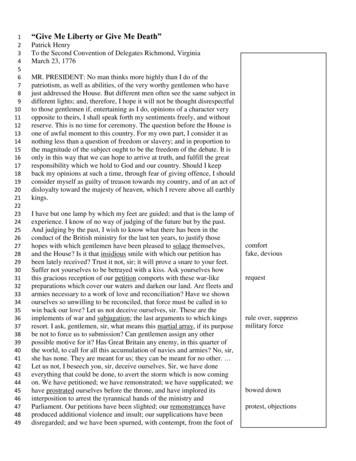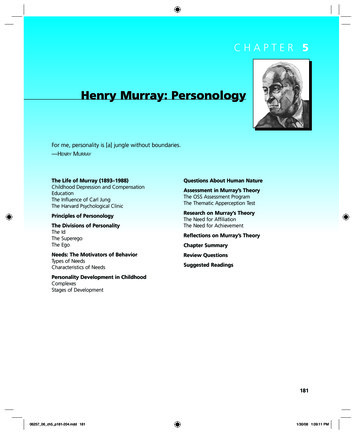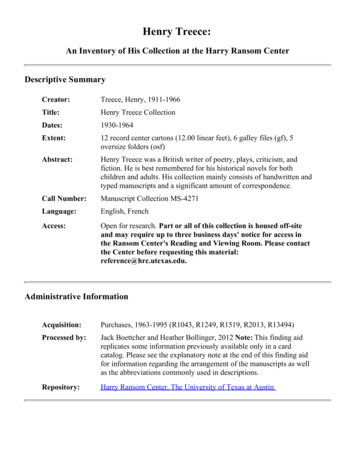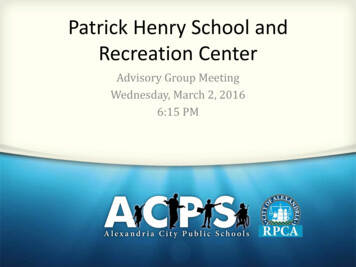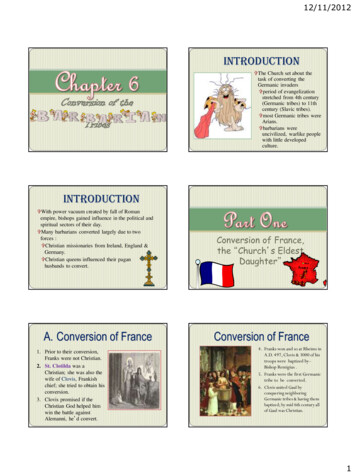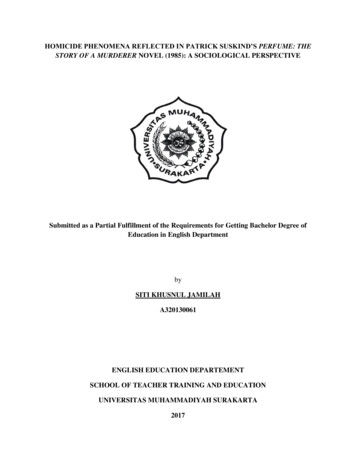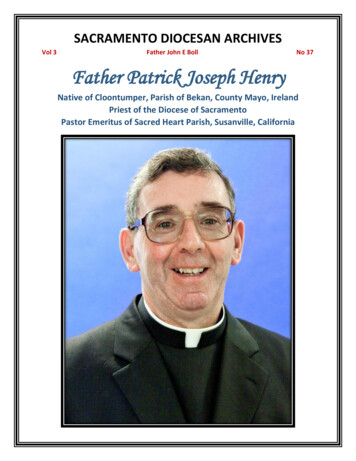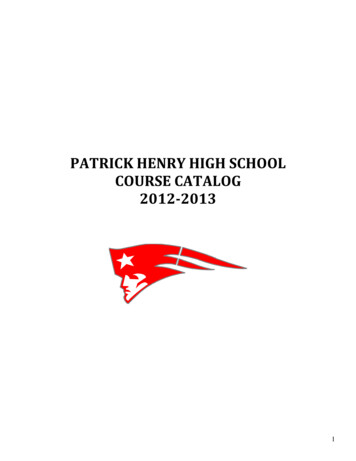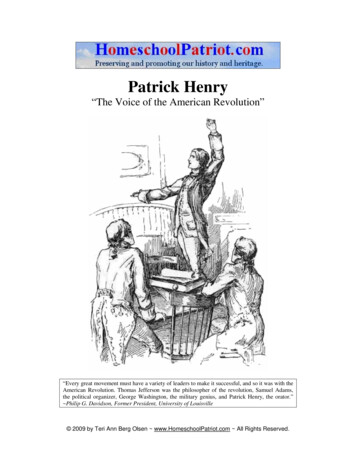
Transcription
Patrick Henry“The Voice of the American Revolution”“Every great movement must have a variety of leaders to make it successful, and so it was with theAmerican Revolution. Thomas Jefferson was the philosopher of the revolution, Samuel Adams,the political organizer, George Washington, the military genius, and Patrick Henry, the orator.” Philip G. Davidson, Former President, University of Louisville 2009 by Teri Ann Berg Olsen www.HomeschoolPatriot.com All Rights Reserved.
Biography of Patrick HenryPatrick Henry (1736-1799) was an eloquent orator and motivational leader at the time ofthe Revolutionary War. He was a great American patriot, a strong believer in citizens’rights, and a prominent spokesman for independence from England. Protesting againstBritish tyranny, Patrick Henry is immortalized as the man who said, “I know not whatcourse others may take, but as for me, give me liberty or give me death!”Patrick Henry was born near Richmond, Virginia on May 29, 1736. He was the second often brothers and sisters. Visitors to Richmond can see the church where Patrick Henryworshiped and places where he made some of his famous speeches. Henry’s fiery andpassionate speaking style was a departure from traditional oratory with its classicalallusions; it was more like the dramatic preaching of evangelical ministers during theGreat Awakening of the 1730’s-40’s.At the age of ten, Patrick was making slow progress in the study of reading, writing andarithmetic at a small country school. So for the next five years, young Patrick was tutoredby his father who was a surveyor and his uncle who was a minister. Patrick learnedmathematics, Latin and Greek, but his favorite subject was history. He would read and reread books about Greece, Rome, England, and the American colonies.Patrick Henry was not interested in formal education and went to work at the age offifteen. When he was eighteen, Patrick married sixteen-year-old Sarah Shelton. They hadsix children but sadly she died in an insane asylum at the young age of 21. Patrick Henryand his second wife, Dorothea Dandridge, had 11 children.Patrick Henry tried farming and managing a general store but failed at both of theseoccupations. At the age of 24 he decided to study law, teaching himself by reading lawbooks. After just six weeks of applying himself to this endeavor, Patrick took the oral barexamination and passed it. Soon he achieved great acclaim as a lawyer. Within the firstthree years he had already handled more than 1,000 cases and won most of them.In 1765, Patrick Henry was elected to the House of Burgesses, which was the lawmakingbody of Virginia. While there, Henry was one of the first to speak in public on the rightsof the colonies to rule themselves. Henry’s moving speeches brought unity to the 2009 by Teri Ann Berg Olsen www.HomeschoolPatriot.com All Rights Reserved.
colonists and stirred them to action against the British. Henry said that they could neverbe free under an English government, and he persuaded Virginia to get ready for war.The colonies did eventually go to war against England, and they became independentstates. Henry was elected as the first Governor of Virginia and served for five terms. Aconstitution was written to establish a government for the United States. Henry opposedthe adoption of the Constitution because he thought it gave too much power to the centralgovernment while taking away too many freedoms and rights from the states. Thisposition would be taken later by his home state of Virginia at the start of the Civil War.Patrick Henry was adamant in demanding the protection of basic individual liberties.After the U.S. Constitution was approved, he fought tirelessly to see that the Bill ofRights – the first ten amendments – were added. These were based on the VirginiaDeclaration of Rights. Historians say that the freedoms in the Bill of Rights would neverhave come about without Henry’s work.Patrick Henry served many terms in the Virginia legislature but always refused to workfor the national government. He turned down many important posts, including U.S.Secretary of State and Chief Justice of the Supreme Court. In his later years, poor healthforced Henry to retire from public service but he resumed his private legal practice. OnMarch 4, 1799, Henry made his last public speech at the Charlotte County Courthouse.Patrick Henry died on June 6, 1799, at his home on Red Hill Plantation.Patrick Henry came of age at the same time our great nation was emerging from Britishrule. He overcame his own failures to become a great statesmen and an active participantin every phase of America’s founding. We will always remember Patrick Henry for hisgift of colorful speaking, and his passion for liberty and self-government. Patrick Henry’simmortal words have been described as “the most famous cry for freedom in the world.”A college in Purcellville, Virginia is named in honor of Patrick Henry. The college wasestablished in 2000 by Michael Farris, founder of the Home School Legal DefenseAssociation. The mission of Patrick Henry College is to train Christian men and womenwho will lead our nation and shape our culture with timeless biblical values and fidelityto the spirit of the American founding. Patrick Henry himself would be honored to knowthat their speech and debate program is one of the best in the nation.Patrick Henry Shocked!It was March 1775 when Patrick Henry, a young Christian lawyer, rode into the small townof Culpepper, Virginia. He was shocked by what he saw! There, in the middle of the townsquare, was a man tied to a whipping post, his back laid bare and bloody. He had beenscourged mercilessly by whips laced with metal.Patrick Henry turned to someone and asked what the man had done to deserve such apunishment. The reply given him was that the man being scourged was a minister who 2009 by Teri Ann Berg Olsen www.HomeschoolPatriot.com All Rights Reserved.
refused to take a license to preach the gospel. The governor was under orders from KingGeorge to compel all preachers to take the license.The minister believed he had a right from God to freely preach the gospel without havingto submit to taking a license from the King of England. He had said, “I am controlled bythe Holy Spirit, and authorized by God Almighty, and will not allow you to control me by alicense, no matter what you may do to me.” For this he was thrown in jail, tried without thebenefit of a jury, and scourged so badly that he died.This was the incident that sparked Patrick Henry to write the famous words which laterbecame the rallying cry of the American Revolution. Modern patriots will find that PatrickHenry’s sentiments apply just as well today. His words are immortal and timeless, makingthe speech as relevant now as it was then.The LIBERTY OR DEATH speech, a.k.a. THE WAR INEVITABLE speech—On March 23, 1775, Patrick Henry addressed the Second Virginia Convention at St. John’sChurch in Richmond. He was 39 years old and had already served in the Virginia coloniallegislature for nearly ten years. Peyton Randolph was President of the Virginia Convention.The Convention was attended by 120 delegates including such notable colonial leaders asGeorge Washington, Thomas Jefferson, and Richard Henry Lee. The meeting turned into aseries of debates over whether or not to arm the colony of Virginia as a defense againstpossible incursions by the British army. Many at the meeting did not want to oppose themother country, instead favoring conciliatory measures. In Patrick Henry’s stirring andpersuasive speech, he forcefully urged them that they needed to arm themselves and beprepared to oppose King George III. He spoke without any notes in a voice that becamelouder and louder, climaxing with the now famous ending. Supposedly the crowd thenjumped up and shouted “To Arms! To Arms!” As a result, Virginia became the first colonyto call for separation from England. 2009 by Teri Ann Berg Olsen www.HomeschoolPatriot.com All Rights Reserved.
THE WAR INEVITABLE:“Give Me Liberty or Give Me Death”By Patrick Henry March 23, 1775No man thinks more highly than I do of the patriotism, as well asabilities, of the very worthy gentlemen who have just addressed theHouse. But different men often see the same subject in differentlights; and, therefore, I hope that it will not be thought disrespectfulto those gentlemen, if, entertaining as I do opinions of a charactervery opposite to theirs, I shall speak forth my sentiments freely andwithout reserve.This is no time for ceremony. The question before the House is one ofawful moment to this country. For my own part I consider it asnothing less than a question of freedom or slavery; and in proportionto the magnitude of the subject ought to be the freedom of the debate.It is only in this way that we can hope to arrive at truth, and fulfill thegreat responsibility which we hold to God and our country. Should Ikeep back my opinions at such a time, through fear of giving offense, Ishould consider myself as guilty of treason towards my country, andof an act of disloyalty towards the majesty of heaven, which I revereabove all earthly kings.Mr. President, it is natural to man to indulge in the illusions of hope.We are apt to shut our eyes against a painful truth, and listen to thesong of that siren, till she transforms us into beasts. Is this the part ofwise men, engaged in a great and arduous struggle for liberty? Are wedisposed to be of the number of those who, having eyes, see not, andhaving ears, hear not, the things which so nearly concern theirtemporal salvation?For my part, whatever anguish of spirit it may cost, I am willing toknow the whole truth -- to know the worst and to provide for it. I havebut one lamp by which my feet are guided; and that is the lamp ofexperience. I know of no way of judging of the future but by the past.And judging by the past, I wish to know what there has been in theconduct of the British ministry for the last ten years, to justify thosehopes with which gentlemen have been pleased to solace themselvesand the House? 2009 by Teri Ann Berg Olsen www.HomeschoolPatriot.com All Rights Reserved.
Is it that insidious smile with which our petition has been latelyreceived? Trust it not, sir; it will prove a snare to your feet. Suffer notyourselves to be betrayed with a kiss. Ask yourselves how thisgracious reception of our petition comports with these warlikepreparations which cover our waters and darken our land. Are fleetsand armies necessary to a work of love and reconciliation? Have weshown ourselves so unwilling to be reconciled that force must becalled in to win back our love? Let us not deceive ourselves, sir. Theseare the implements of war and subjugation -- the last arguments towhich kings resort. I ask gentlemen, sir, what means this martialarray, if its purpose be not to force us to submission? Can gentlemenassign any other possible motives for it? Has Great Britain anyenemy, in this quarter of the world, to call for all this accumulation ofnavies and armies?No, sir, she has none. They are meant for us; they can be meant for noother. They are sent over to bind and rivet upon us those chainswhich the British ministry have been so long forging. And what havewe to oppose to them? Shall we try argument? Sir, we have beentrying that for the last ten years. Have we anything new to offer on thesubject? Nothing.We have held the subject up in every light of which it is capable; but ithas been all in vain. Shall we resort to entreaty and humblesupplication? What terms shall we find which have not been alreadyexhausted? Let us not, I beseech you, sir, deceive ourselves longer.Sir, we have done everything that could be done to avert the stormwhich is now coming on. We have petitioned; we have remonstrated;we have supplicated; we have prostrated ourselves before the throne,and have implored its interposition to arrest the tyrannical hands ofthe ministry and Parliament.Our petitions have been slighted; our remonstrances have producedadditional violence and insult; our supplications have beendisregarded; and we have been spurned, with contempt, from the footof the throne. In vain, after these things, may we indulge the fondhope of peace and reconciliation. There is no longer any room forhope. 2009 by Teri Ann Berg Olsen www.HomeschoolPatriot.com All Rights Reserved.
If we wish to be free -- if we mean to preserve inviolate thoseinestimable privileges for which we have been so long contending -- ifwe mean not basely to abandon the noble struggle in which we havebeen so long engaged, and which we have pledged ourselves never toabandon until the glorious object of our contest shall be obtained, wemust fight! I repeat it, sir, we must fight! An appeal to arms and to theGod of Hosts is all that is left us!They tell us, sir, that we are weak -- unable to cope with so formidablean adversary. But when shall we be stronger? Will it be the next week,or the next year? Will it be when we are totally disarmed, and when aBritish guard shall be stationed in every house? Shall we gatherstrength by irresolution and inaction? Shall we acquire the means ofeffectual resistance, by lying supinely on our backs, and hugging thedelusive phantom of hope, until our enemies shall have bound ushand and foot?Sir, we are not weak, if we make a proper use of the means which theGod of nature hath placed in our power. Three millions of people,armed in the holy cause of liberty, and in such a country as that whichwe possess, are invincible by any force which our enemy can sendagainst us. Besides, sir, we shall not fight our battles alone. There is ajust God who presides over the destinies of nations, and who willraise up friends to fight our battles for us.The battle, sir, is not to the strong alone; it is to the vigilant, theactive, the brave. Besides, sir, we have no election. If we were baseenough to desire it, it is now too late to retire from the contest. Thereis no retreat but in submission and slavery! Our chains are forged!Their clanking may be heard on the plains of Boston! The war isinevitable -- and let it come! I repeat it, sir, let it come!It is in vain, sir, to extenuate the matter. Gentlemen may cry, “Peace!Peace!” -- but there is no peace. The war is actually begun! The nextgale that sweeps from the north will bring to our ears the clash ofresounding arms! Our brethren are already in the field! Why stand wehere idle? What is it that gentlemen wish? What would they have? Islife so dear, or peace so sweet, as to be purchased at the price ofchains and slavery? Forbid it, Almighty God! I know not what courseothers may take; but as for me, give me liberty, or give me death! 2009 by Teri Ann Berg Olsen www.HomeschoolPatriot.com All Rights Reserved.
VocabularyFind and underline the following words in “Give Me Liberty or Give Me Death,” whilestudying their definitions in the context of the speech.inevitable - unavoidablepatriotism - love of one’s country, the characteristic of a good citizengentlemen - men of refinement or high classreserve - restraint; holding back wordsceremony - an outward form of civility established by order or customtreason - betraying (going against) one’s own countryrevere - to regard with fear mingled with respect and affectionindulge - to gratify, favor, or withhold restraint fromillusions - deception by which a person is fooled, or his expectations disappointedarduous - difficult; attended with great labortemporal - pertaining to the world, as opposed to spiritualanguish - extreme pain or griefsolace - to take comfort or consoleinsidious - lying in wait, intended to trappetition - requestbetrayed - delivered into the hands of an enemy in violation of trustcomports - agreesreconciliation - renewal of friendship after disagreement or enmitydeceive - misleadimplements - tools, vessels, implementssubjugation - the act of subduing and bringing under the power or control of anotherresort - to apply or fall back onmartial - warlike; suited to battleaccumulation - an amassing; a collecting togetherrivet - to fasten firmly with a metal pinvain - worthless; fruitless; not effectiveentreaty - earnest petitionsupplication - earnest prayerbeseech - implore; ask with urgencyavert - to turn from or keep awayremonstrated - to present strong reasons against an act or in opposition to a measureprostrated - laid at length, laid flat, thrown downimplored - earnestly soughtinterposition - intervention; mediationtyrannical - suiting a tyrant who wields unjust exercise of powerdisregarded - neglected; slighted; unnoticedspurned - rejectedcontempt - the state of being despised and hatedinviolate - unhurt, uninjured, unbrokeninestimable - too valuable to be estimated or counted 2009 by Teri Ann Berg Olsen www.HomeschoolPatriot.com All Rights Reserved.
contending - striving, struggling, debatingarms - weapons of offense and armor for defenseformidable - exciting fear, dread, or apprehensionadversary - an enemy or foe; opponent or antagonistsupinely - carelessly; in a heedless, thoughtless statedelusive - apt to deceive; tending to mislead; deceptivevigilant - watchful; attentive to discover and avoid danger, or to provide for safetyextenuate - to lessen or diminish, as a crime or guiltgale - a storm or tempest with strong windsliberty - freedom from the control of othersDiscussion Questions1. Who was Patrick Henry? Why was his speech so memorable?2. Patrick Henry was known as a fiery and passionate orator. What do you think madePatrick Henry such a powerful speechmaker? In what ways do people with a talent for“colorful speaking” benefit our society?3. What was the purpose of Patrick Henry’s speech?4. Who was Patrick Henry’s audience? Were his words appropriate for this audience?Why or why not? Considering his audience, why does he begin his speech the way hedoes?5. On what date did Patrick Henry give this speech? Was it before or after the Declarationof Independence was written?6. Remember that Patrick Henry was not addressing fellow rebels at a secret meeting; hewas making a bold public statement in front of the Virginia assembly. At that time,treason found much quicker justice. In fact, there were several calls for Patrick Henry'shead during the speech, but he kept going. What does this say about his character? Haveyou ever courageously stood up for your convictions?7. To whom is Patrick Henry referring when he says “Mr. President”?8. What is meant by the phrase “awful moment”? Has America had to face any other“awful moments”? Have you personally ever faced an “awful moment”?9. Patrick Henry states that, should he keep silent through fear of giving offense, hewould be guilty of two major offenses. What are they?10. How many references to slavery can you find in Patrick Henry’s speech? Why do youthink he refers to slavery so often? 2009 by Teri Ann Berg Olsen www.HomeschoolPatriot.com All Rights Reserved.
11. Explain: “We are apt to shut our eyes against a painful truth, and listen to the song ofthat siren till she transforms us into beasts.” What does this mean?12. What are “the last arguments to which kings resort”?13. What did Britain do that got Patrick Henry so riled up?14. What efforts have the colonies made to fix the situation with the king? How effectivedoes Patrick Henry feel these efforts have been?15. Consider the phrase: “They tell us, sir, that we are weak -- unable to cope with soformidable an adversary.” Does this remind you of any Bible heroes? Who?16. What point does Patrick Henry make against waiting any longer?17. What advantages/strengths do the colonies have, according to Patrick Henry?18. If you had been a delegate at the Virginia Convention, would you have agreed ordisagreed with what Patrick Henry was saying? Do you think you might have beenswayed by his arguments? Why or why not?19. Would you describe Patrick Henry as a statesman or a politician? Why? What is thedifference?20. Can you think of any modern day scenario(s) to which the sentiments in this speechmight apply?Writing Questions1. What did you think of Patrick Henry’s speech? Did anything surprise you about it? Writedown your impressions of the speech. Note any particular words and phrases that caughtyour attention or impressed you the most.2. Paraphrasing a text – rewriting it with different wording – is often used as an educationalexercise to reinforce reading comprehension skills. Show that you understand the meaningof Patrick Henry’s speech by paraphrasing it in your own words.3. Patrick Henry’s speech ended with this famous quote: “Is life so dear, or peace sosweet, as to be purchased at the price of chains and slavery? Forbid it, Almighty God! Iknow not what course others may take; but as for me, give me liberty or give me death!”Restate this quotation in your own words, trying to use similarly bold language.4. Patrick Henry was a great American patriot with a passion for liberty. Write an essayabout what it means to be a patriot, and/or what liberty means to you. 2009 by Teri Ann Berg Olsen www.HomeschoolPatriot.com All Rights Reserved.
Research Questions1. Patrick Henry was a lawyer, orator, statesman, and the first governor of Virginia.Research these job titles and find out what a person does in each of these jobs.2. Read about Patrick Henry online or in a book. Write down ten of the most interestingthings you learn about him.3. In the Boston Tea Party, American Colonists protested against taxation withoutrepresentation by dumping hundreds of tea containers into Boston Harbor. In retaliation,the British Parliament passed a series of Acts aimed at bringing the colonies back intosubmission to the King. The colonists called these acts “intolerable” and “coercive.”Look up the Intolerable Acts. What was “intolerable” about these acts?4. Do an internet search for Richmond, Virginia, and St. John’s Church. What interestingfacts can you find out about these historically significant places?Special Gifts & TalentsThe American Revolution depended upon many men with a variety of different talents tomake it a success. Match these patriots with the special gifts that allowed them to bestcontribute to the fight for American independence (hint: see quote on cover page).1. philosopher and writer2. military genius; commander3. political organizer4. voice of the revolution; oratorSamuel AdamsPatrick HenryThomas JeffersonGeorge WashingtonWhat special gifts do you have? How might your unique talents be put to good use?ActivityIn oral rhetoric, delivery refers to theways in which an orator usesgestures and changes his or her voice(i.e. tone and volume) to accompanythe spoken words. Practice recitingthe “Give Me Liberty or Give MeDeath” speech while concentratingon your delivery, considering howPatrick Henry may have done it. 2009 by Teri Ann Berg Olsen www.HomeschoolPatriot.com All Rights Reserved.
Rhetorical Techniques & Literary DevicesThe study of rhetoric can be traced back to classical Greece. Rhetoric is the art or scienceof persuasion by means of stylistic and structural techniques. Rhetoric involves makingstrategic choices about what words to use and how to arrange them in order to deliver themost memorable, enjoyable, and persuasive presentation. In addition, many commonliterary devices are used in speeches as well as in written works.Alliteration – Repetition of the same letter or sound for emphasis or effect (e.g., “sing asong of sixpence”).Allusion – A brief reference to a historical or literary figure or event that the targetaudience would understand and respect. (i.e. the Bible, or Shakespeare).Analogy – A comparison between two things. A simile is a stated comparison of twothings using the words “like” or “as” (cheeks like roses), while a metaphor is an impliedcomparison without using the words “like” or “as” (rosy cheeks).Appeal – An attempt to earn audience approval or agreement by means of persuasivetechniques. Three common methods include appeals through logos (logic of theargument), pathos (appeal to the emotion of the argument), and ethos (character orauthority of the writer or speaker).Bandwagon – Appealing to one’s sense of belonging, i.e. “Everyone is doing it and youshould too.”Common Ground – A point at which those in general disagreement can agree, a goodpoint at which to start if the audience is likely to oppose a claim or reject an arguments.Cause and Effect – An argument that makes claims about real or potential consequencesof an action or proposal, saying what will happen if a certain action is taken. A writer orspeaker may also argue that the effect of a certain action has a specific cause.Emotion – Using emotive language and tear-jerking examples to play on the audience’semotions or try to make them feel guilty.Example – Using a specific instance or anecdote to illustrate, clarify, or bolster anargument.Facts and Figures – Quantifiable evidence that is quoted to support a claim. Althoughstatistics can be manipulated to misrepresent the facts, they are usually quite convincing.Figurative Language – The use of words that say one thing and mean another.Hyperbole – Exaggeration used to emphasize a point, appeal to emotion, or get attention.Imperative – A sentence that expresses a request or command that makes the audiencefeel like they should do what you are suggesting.Irony – Stating the opposite of what is really meant, in a funny or shocking way.Machine-Gunning – Machine-gunning is the opposite of the Rule of Three. In this case,you quickly run off a long list of points to emphasize how many reasons there are for oragainst an issue. You don’t care how many the audience remembers; you just want toimpress them with the number of items on your list. 2009 by Teri Ann Berg Olsen www.HomeschoolPatriot.com All Rights Reserved.
Onomatopoeia – Words that imitate a natural sound (BANG, WHAM, POW) are allgreat for emphasizing key points and waking up the audience.Paradox – A seeming contradiction that contains some truth (“so close and yet so far”).Parallelism – Repetition of a word or grammatical structure for emphasis and effect.Done well, parallelism imparts grace and power to a message: “Ask not what yourcountry can do for you—ask what you can do for your country.”Personification – Giving human qualities to non-human things (e.g., referring to a shipas “she”).Rapport – Using words like “we,” “us,” or “all of us” (instead of “you”) builds a bridgebetween you and your audience, as in “We all know what problems that can cause, don’twe?” In other words, “We’re all in the same boat.”Rebuttal – An argument that refutes an opponent’s argument.Repetition – The conscious and purposeful replication of words or phrases in order tomake a point. “Duty does not trump honesty. Duty does not trump common sense. Andduty, my friends, does not trump morality.”Rhetorical Question – A question that is not meant to be answered but to be pondered(i.e., “Do you think this is fair?”).Rule of Three – Experienced public speakers all know the power of the Rule of Three.Lists of three are more memorable than lists of four or more. (Example: “A goodpresentation should be concise, informative, and memorable.”)Slanted Language – The use of words packed with emotion to invoke a strong reactionfrom the audience and make people feel a certain way. Positive slanted language includeswords like smooth, fresh, and crystal clear. Negative slanted words include overdue,crowded, and noisy.Symbolism – Use of an image or object to represent an idea or something else. A motif isa symbol carried throughout an entire work, such as the One Ring in Lord of the Rings.Testimony – Using the words or ideas of an expert or someone who has authority, togive an argument greater credibility.Assignments1. See if you can identify some examples of rhetorical techniques and literary devices thatare used in Patrick Henry’s speech. Write the selected words or phrases on a separate pieceof paper, along with the name of the technique or device that you think it exemplifies.2. Patrick Henry had a marvelous command of the English language. Make a list of words,phrases, and action verbs from the speech that struck you as especially strong or colorful.3. Which of Patrick Henry’s phrases remind you of Scripture verses? (Hint: Hebrews 1:3,Mark 8:18, Psalm 119:105, Psalm 140:5, Luke 22:48, Ezekiel 7:25) 2009 by Teri Ann Berg Olsen www.HomeschoolPatriot.com All Rights Reserved.
The Bill of RightsIt was Patrick Henry who demanded that a “Bill of Rights” be part of the Constitution toguarantee the protection of basic individual liberties. After the U.S. Constitution – thesupreme law of the land – was approved, he fought tirelessly to see that the first tenamendments – the Bill of Rights – were added. Historians say that the freedoms in theBill of Rights would never have come about without Patrick Henry.Amendment ICongress shall make no law respecting an establishment of religion, or prohibiting the freeexercise thereof; or abridging the freedom of speech, or of the press; or the right of the peoplepeaceably to assemble, and to petition the government for a redress of grievances.[Prohibits the establishment of a state religion and guarantees the freedom to practice one’sreligion; protects freedom of speech and the press, as well as the right to assemble peaceablyand petition for changes in the government.]Amendment IIA well regulated militia, being necessary to the security of a free state, the right of the people tokeep and bear arms, shall not be infringed.[Protects the right of people to have weapons and own guns. A militia is a military force ofordinary citizens who are not part of a regular army.]Amendment IIINo soldier shall, in time of peace be quartered in any house, without the consent of the owner, norin time of war, but in a manner to be prescribed by law.[The government may not house soldiers in citizen’s homes during peacetime without th
Patrick Henry (1736-1799) was an eloquent orator and motivational leader at the time of . arithmetic at a small country school. So for the next five years, young Patrick was tutored . At the age of 24 he decided to study law, teaching himself by reading law books. After just six weeks of applying himself to this endeavor, Patrick took the .

